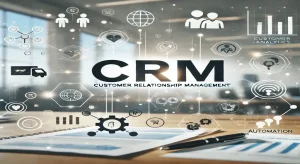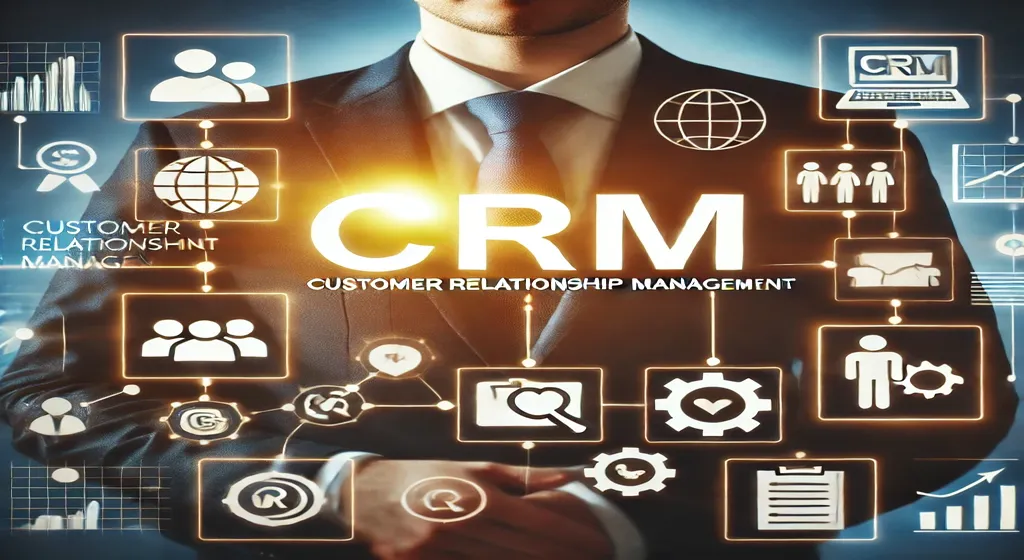- What is CRM? A Comprehensive Guide to Customer Relationship Management
- What is CRM?
- Key Components of CRM
- Benefits of CRM Systems
- Types of CRM Technology
- Common Features of CRM Systems
- Choosing the Right CRM for Your Business
- CRM Examples in Practice
- Challenges of CRM Implementation
- The Future of CRM: AI and Automation
- <strong>The Role of CRM in Business Growth and Customer Satisfaction</strong>
- Conclusion
What is CRM? A Comprehensive Guide to Customer Relationship Management
In today’s competitive business landscape, building and maintaining strong relationships with customers is more important than ever. Companies that excel in this area often find themselves with a distinct competitive advantage, fostering loyalty and driving growth. This is where Customer Relationship Management (CRM) systems come into play. But what exactly is CRM, and why is it so vital for businesses of all sizes? In this comprehensive guide, we will delve into the concept of CRM, explore its key components and benefits, examine the various types of CRM technologies available today, and provide practical examples and real-world applications to illustrate its significance.
What is CRM?
Customer Relationship Management (CRM) refers to a combination of strategies, technologies, and practices that businesses use to manage and analyze customer interactions and data throughout the customer lifecycle. The ultimate goal of a CRM system is to improve business relationships, streamline processes, and enhance both customer satisfaction and profitability. By centralizing customer information, CRM systems enable companies to maintain a comprehensive view of each customer, understand their needs and preferences, and deliver personalized experiences across all touchpoints.
CRM systems compile customer data from a variety of channels and interactions between the customer and the company, such as the company’s website, telephone calls, live chat, email, direct mail, marketing materials, and social media. This data aggregation allows for a unified approach to managing customer relationships, helping businesses anticipate customer needs, tailor communications, and build long-lasting relationships.
Key Components of CRM
CRM systems are typically divided into three main components, each addressing a specific area of customer relationship management:
- Operational CRM
Operational CRM focuses on streamlining business processes by automating sales, marketing, and customer service operations. By managing these processes more efficiently, businesses can improve productivity and reduce operational costs. Key features of operational CRM include:- Sales Force Automation (SFA): Automates various stages of the sales process, including tracking customer interactions, managing leads, and following up with prospects. SFA tools help sales teams work more efficiently by reducing manual tasks and providing insights into customer behavior, which can drive sales growth.
- Marketing Automation: Helps automate repetitive marketing tasks, such as email campaigns, social media posts, and targeted advertisements. This allows marketing teams to focus on strategy while the CRM system handles execution, leading to more effective lead generation and nurturing throughout the customer lifecycle.
- Service Automation: Automates customer service processes, including managing support tickets, handling inquiries, and providing self-service options. Service automation improves response times, reduces the workload of customer service agents, and enhances the overall customer experience.
- Analytical CRM
Analytical CRM is all about analyzing customer data to gain insights into customer behaviors and preferences. By understanding what drives customer decisions, businesses can make more informed, data-driven decisions. Key features of analytical CRM include:- Data Mining: Involves extracting patterns and insights from large datasets, allowing businesses to understand trends, identify opportunities, and predict customer behavior. This can inform everything from product development to personalized marketing strategies.
- Customer Segmentation: Divides customers into distinct groups based on criteria such as demographics, purchasing history, and behavior. Segmentation allows for more targeted marketing efforts and personalized communication strategies that resonate more effectively with different customer groups.
- Predictive Analytics: Uses historical data to forecast future customer behaviors, such as the likelihood of a purchase or the risk of churn. Predictive analytics helps businesses proactively address customer needs and reduce the chances of losing valuable customers.
- Collaborative CRM
Collaborative CRM focuses on improving communication and collaboration among different departments within an organization. By ensuring that all teams have access to up-to-date customer information, businesses can deliver a seamless and consistent customer experience. Key features of collaborative CRM include:- Interaction Management: Tracks all customer interactions across various channels, ensuring that information is readily available to all relevant departments. This facilitates a unified approach to customer engagement and helps prevent communication silos.
- Channel Management: Manages the different communication channels used to interact with customers, such as social media, email, and phone calls. Effective channel management ensures that customers receive timely and relevant communication regardless of their preferred channel.
Benefits of CRM Systems
Implementing a CRM system offers numerous benefits that can significantly impact a business’s ability to compete and thrive:
- Enhanced Customer Service: By providing a comprehensive view of each customer’s history and preferences, CRM systems empower customer service representatives to offer more personalized and efficient support. This improves customer satisfaction and fosters loyalty.
- Improved Sales Performance: CRM systems streamline the sales process by managing leads, tracking interactions, and automating repetitive tasks. This leads to increased sales efficiency, higher conversion rates, and greater revenue. Sales teams can also use CRM data to forecast sales and identify opportunities for cross-selling and upselling.
- Better Customer Retention: Understanding customer needs and preferences allows businesses to offer more tailored experiences, leading to higher customer retention rates. CRM systems can also identify at-risk customers and prompt timely interventions to prevent churn.
- Data-Driven Decision-Making: CRM systems provide robust analytics and reporting tools that help businesses analyze customer data, identify trends, and make informed decisions. This data-driven approach improves strategic planning, optimizes marketing efforts, and enhances overall business performance.
- Increased Collaboration: By centralizing customer information, CRM systems improve collaboration across departments, ensuring that all teams have access to the same data and insights. This fosters a more cohesive approach to managing customer relationships and enhances the overall customer experience.
Types of CRM Technology
Cloud-Based CRM
Cloud-based CRM, also known as Software as a Service (SaaS), allows data to be stored on an external, remote network that employees can access anytime and anywhere. This type of CRM is ideal for companies with limited IT resources and offers quick deployment and scalability. Popular cloud-based CRM providers include HubSpot, Salesforce, Zendesk, Zoho and FireXCore CRM.
Advantages:
- Quick and easy deployment
- Access from any location with internet connectivity
- Reduced IT costs and maintenance
- Scalable to meet growing business needs
Disadvantages:
- Data security concerns due to external data storage
- Potential compatibility issues during data migration
- Dependence on the service provider for uptime and support
On-Premises CRM
On-premises CRM involves installing the CRM software on the company’s own servers. This approach provides greater control over data security and customization but requires significant upfront investment and ongoing maintenance. Companies with complex CRM needs might benefit from an on-premises deployment.
Advantages:
- Greater control over data and security
- Customizable to specific business needs
- No dependency on external service providers
Disadvantages:
- High upfront costs and ongoing maintenance expenses
- Longer implementation time
- Requires in-house IT expertise
Open Source CRM
Open Source CRM systems provide access to the source code, allowing companies to customize and modify the software to meet their specific needs. This type of CRM is cost-effective and flexible, making it a popular choice for businesses with unique requirements. Platforms such as Bitrix24, OroCRM, SugarCRM, and SuiteCRM offer alternatives to proprietary platforms from vendors like Salesforce and Microsoft.
Advantages:
- No licensing fees
- High customization potential
- Active user and developer communities
Disadvantages:
- Requires technical expertise for customization and maintenance
- Potential lack of support and documentation
Common Features of CRM Systems
Regardless of the type of CRM technology chosen, most systems offer a range of features designed to enhance customer relationship management:
- Contact Management: Centralizes customer information, including contact details, communication history, and preferences, making it easier to manage relationships and maintain organized records.
- Sales Management: Tracks customer interactions and sales pipelines, automates sales processes, and provides tools for managing leads, opportunities, and forecasting sales performance.
- Marketing Automation: Automates repetitive marketing tasks and provides tools for campaign management, lead nurturing, and analytics, helping to enhance customer engagement and generate leads.
- Customer Service Management: Offers tools for managing customer inquiries, support tickets, and feedback, ensuring timely and effective resolution of issues and improving customer satisfaction.
- Analytics and Reporting: Provides powerful analytics and reporting tools that help businesses gain insights into customer behavior, measure performance, and make data-driven decisions.
Choosing the Right CRM for Your Business
When selecting a CRM system, consider your business needs, budget, and scalability. Look for a user-friendly interface, integration capabilities with other tools, and features that align with your business objectives. A cloud-based CRM for small businesses can be an excellent choice due to its cost-effectiveness and ease of use. Cloud-based CRM solutions are particularly beneficial for small businesses that need to manage customer relationships without investing heavily in IT infrastructure.
For larger enterprises, a cloud-based CRM for big business offers the scalability and robust features necessary to handle complex customer relationship management needs. These solutions provide advanced analytics, high-level security, and integration with a wide range of enterprise tools, ensuring that all aspects of customer interactions are managed efficiently and effectively.
FireXCore CRM solution is a perfect example of a comprehensive and flexible system that can adapt to your business’s unique requirements. With advanced features like AI-powered insights, seamless integration with existing tools, and a user-friendly interface, our CRM can help you streamline processes, enhance customer service, and drive sales growth.
Whether you choose a cloud-based CRM for small business or a cloud-based CRM for big business, ensure it meets your organization’s requirements and enhances your ability to manage customer relationships effectively.
CRM Examples in Practice
CRM systems are used in a variety of ways across different industries and business models. Here are a few examples of how CRM can be applied in practice:
- Contact Centers: In a contact center environment, CRM systems are used to manage customer interactions and support cases, ensuring that agents have access to all relevant information when responding to inquiries. This helps improve response times and enhance the overall customer experience.
- Social CRM: Social CRM integrates with social media platforms, allowing businesses to engage with customers, monitor conversations, and analyze feedback. This approach helps companies better understand customer sentiments and adjust their strategies accordingly.
- Mobile CRM: Mobile CRM applications allow sales and marketing professionals to access customer data and perform tasks on the go, enhancing productivity and responsiveness. These apps often leverage features like GPS and voice recognition to provide a seamless mobile experience.
- B2B CRM: In a B2B environment, CRM systems help track sales as they progress through the sales funnel, providing visibility into each stage and enabling businesses to address potential issues promptly. This visibility improves efficiency and helps drive sales growth.
Challenges of CRM Implementation
While CRM systems offer numerous benefits, implementing them can present several challenges. Companies may struggle to achieve a unified view of the customer if their data is not well-organized or integrated across all departments. Inconsistent or outdated data can lead to a poor customer experience and reduce the effectiveness of CRM efforts.
To overcome these challenges, businesses need to invest in proper data management practices, including data cleansing and integration with external data sources. Additionally, successful CRM implementation requires buy-in from all levels of the organization and ongoing training to ensure that users are fully equipped to leverage the system’s capabilities.
The Future of CRM: AI and Automation
The future of CRM is increasingly being shaped by advancements in artificial intelligence (AI) and automation technologies. AI-powered CRM systems can analyze vast amounts of data to provide insights into customer behavior, predict future trends, and automate routine tasks. For example, predictive analytics can forecast which customers are most likely to purchase a product, while AI-driven chatbots can handle customer inquiries and provide personalized recommendations in real-time.
Automation also plays a key role in modern CRM systems, streamlining processes such as data entry, follow-up communications, and lead scoring. By reducing the manual workload, automation allows sales and marketing teams to focus on more strategic activities, ultimately driving better results.
The Role of CRM in Business Growth and Customer Satisfaction
CRM systems not only streamline operations but also play a critical role in enhancing business growth and customer satisfaction. By leveraging the wealth of data gathered through CRM, businesses can create personalized experiences, anticipate customer needs, and foster long-term loyalty. CRM systems empower businesses to proactively address challenges, resolve customer issues faster, and ensure consistent engagement across multiple channels. With features like real-time analytics, automated communications, and comprehensive customer insights, CRM helps businesses maintain a competitive edge in an increasingly customer-centric market. Embracing CRM technology means not just improving customer interactions, but driving profitability and long-term business success.
Conclusion
Customer Relationship Management (CRM) is essential for businesses of all sizes. By leveraging the right CRM system, companies can improve customer service, increase sales, and make informed decisions based on valuable customer insights. Investing in a CRM system is not just about managing contacts; it’s about building stronger, more profitable relationships with your customers and driving business growth.
Are you ready to take your customer relationships to the next level? Our cutting-edge CRM solution is designed to help businesses like yours streamline processes, enhance customer service, and drive sales growth. With features tailored to meet your specific needs, our CRM system offers unparalleled flexibility and scalability.
Discover the power of our CRM solution today:
- Seamless Integration: Easily integrate with your existing tools and systems for a smooth transition.
- User-Friendly Interface: Our intuitive design ensures that your team can get up and running quickly.
- Advanced Analytics: Gain deep insights into customer behavior and make data-driven decisions.
- AI-Powered Features: Leverage the power of artificial intelligence to automate routine tasks, predict customer needs, and provide personalized experiences.
- Mobile Access: Stay connected and productive from anywhere with our mobile-friendly platform.
Don’t miss out on the opportunity to transform your business. Contact us now for a personalized demo and see how our CRM solution can help you build stronger customer relationships and achieve your business goals. Let us help you grow your business and exceed your customers’ expectations!






